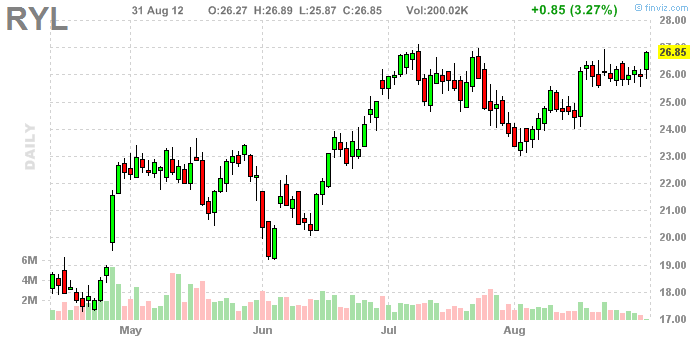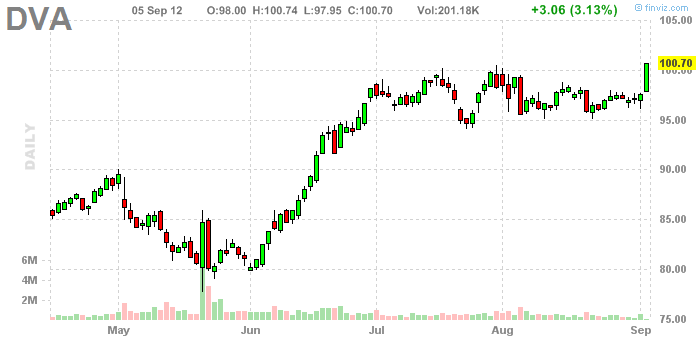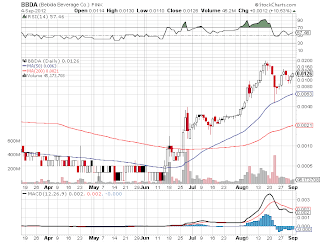sábado, 30 de noviembre de 2013
Forex BlackRock to Buy ETF firm Claymore
jueves, 28 de noviembre de 2013
Earn BBDA hit $.0199 From $.0004 Alert
The stock fell after hitting $.0199 but recovered its losses and closed higher today. Strong interest remains in this stock that had almost no interest when I alerted it at $.0003/.0004.
martes, 3 de septiembre de 2013
Forex COBI - Chart To Watch at $.001
The above chart is what COBI looked like when I made it one of my charts to watch for my subscribers at $.001.
This is what COBI's chart looks like after the close today:
Earn SAGD Running After The Dump
SAGD had a strong showing today and has made a nice move off its dump lows. We could see the stock move back over $.01 if this momentum and buying pressure continue.
lunes, 27 de mayo de 2013
Signals Germany wants Greece to give up budget control
Oil Obama seeks power to merge agencies
domingo, 26 de mayo de 2013
Signals Swing trade idea: RYL

jueves, 23 de mayo de 2013
Signals BBDA - One of My Best Alerts Ever Forming Cup and Handle?
BBDA was an alert to my subscribers at $.0003/.0004 a share. The stock recently hit almost $.02 a share. Today the stock is still holding to gains and is looking very strong.
http://thepennystockgurus.com/articles/bbda-stock-soars-from-0003-0004-to-0144/
BBDA continues to maintain strong bid support, and could have formed a cup and handle. This means this stock is poised to break to new highs? We will soon find out.
viernes, 17 de mayo de 2013
Forex Germany wants Greece to give up budget control
Forex Obama seeks power to merge agencies
lunes, 15 de abril de 2013
Earn Stocks' correction coming? Not that again
domingo, 14 de abril de 2013
Oil Fitch cuts Italy, Spain, other euro zone ratings
Forex France loses AAA-rating in blow to eurozone
viernes, 12 de abril de 2013
Signals China to reform, grow economy, IMF eyes freer yuan
Earn Stocks' correction coming? Not that again
domingo, 31 de marzo de 2013
Forex Airbus expects years of grappling with A380 cracks
Signals Mexico says G20 to look at smoothing capital flows
domingo, 10 de marzo de 2013
miércoles, 27 de febrero de 2013
Earn Greece, creditors laboriously piece together debt deal
miércoles, 13 de febrero de 2013
Signals Stock Market for 10/12/12
Oil Mexico says G20 to look at smoothing capital flows
Oil Germany wants Greece to give up budget control
martes, 12 de febrero de 2013
Oil Rate on 30-year mortgage drops to record 3.89 pct.
Newly built luxury townhomes are offered for sale in Woodland Hills, Calif. Tuesday, Jan. 10, 2012. Fixed mortgage rates hit yet another record low on the second week of the new year. But the cheap rates are expected to do little to boost the depressed housing market. (AP Photo/Damian Dovarganes) Newly built luxury townhomes are offered for sale in Woodland Hills, Calif. Tuesday, Jan. 10, 2012. Fixed mortgage rates hit yet another record low on the second week of the new year. But the cheap rates are expected to do little to boost the depressed housing market. (AP Photo/Damian Dovarganes) WASHINGTON (AP) -- Fixed mortgage rates fell once again to a record low, offering a great opportunity for those who can afford to buy or refinance homes. But few are able to take advantage of the historic rates. Freddie Mac said Thursday the average rate on the 30-year fixed mortgage fell to 3.89 percent. That's below the previous record of 3.91 percent reached three weeks ago. Records for mortgage rates date back to the 1950s. The average on the 15-year fixed mortgage ticked down to 3.16 percent. That's down from a record 3.21 percent three weeks ago. Mortgage rates are lower because they track the yield on the 10-year Treasury note, which fell below 2 percent. They could fall even lower this year if the Fed launches another round of bond purchases, as some economists expect. [Click here to check home loan rates in your area.] Average fixed mortgage rates hovered around 4 percent at the end of 2011. Yet many Americans either can't take advantage of the rates or have already done so. High unemployment and scant wage gains have made it harder for many people to qualify for loans. Many don't want to sink money into a home that they fear could lose value over the next few years. Mortgage applications have fallen slightly on a seasonally adjusted basis over the past four weeks, according to the Mortgage Bankers Association. Frank Nothaft, Freddie Mac's chief economist, said that until hiring picks up and unemployment drops significantly, the impact of lower mortgage rates will remain muted. Previously occupied homes are selling just slightly ahead of 2010's dismal pace. New-home sales in 2011 will likely be the worst year on records going back half a century. Builders hope that the low rates could boost sales next year. Low mortgage rates were cited as a key reason the National Association of Home Builders survey of builder sentiment rose in December to its highest level in more than a year. But so far, they have had little impact on the depressed housing market. To calculate the average rates, Freddie Mac surveys lenders across the country Monday through Wednesday of each week. The average rates don't include extra fees, known as points, which most borrowers must pay to get the lowest rates. One point equals 1 percent of the loan amount. The average fee for the 30-year loan fell to 0.7 from 0.8; the average on the 15-year fixed mortgage was unchanged at 0.8. For the five-year adjustable loan, the average rate declined to 2.82 percent from 2.86 percent. The average on the one-year adjustable loan fell to 2.76 percent from 2.80 percent. The average fee on the five-year adjustable loan rose was unchanged at 0.7; the average on the one-year adjustable-rate loan was unchanged at 0.6.
Forex A slow grinding higher move
Underlying action on many stocks is sideways. As this kind of action has continued for few months, many stocks are setting up well. But absent breadth thrust breakouts are fading.
In this climate anticipation of breakout or breakdown is better approach than chasing breakouts or breakdown.
Forex Slow start so far
On the downside WM, EPAM and KLIC are some of the notable breakdowns.
lunes, 11 de febrero de 2013
Signals BBDA - One of My Best Alerts Ever Forming Cup and Handle?
BBDA was an alert to my subscribers at $.0003/.0004 a share. The stock recently hit almost $.02 a share. Today the stock is still holding to gains and is looking very strong.
http://thepennystockgurus.com/articles/bbda-stock-soars-from-0003-0004-to-0144/
BBDA continues to maintain strong bid support, and could have formed a cup and handle. This means this stock is poised to break to new highs? We will soon find out.
Earn SRGE Continues It Strong Move Out Of Triple Zero's
DALLAS, TX, Sep 05, 2012 (MARKETWIRE via COMTEX) -- Southridge Enterprises Inc. (PINKSHEETS: SRGE) ('Southridge' or the 'Company') is pleased to announce that it has recorded milestone mineral production and revenues for the fourth quarter and year ending August 31, 2012, from its 60 ton per day (tpd) mill site at Cinco Minas in Jalisco, Mexico. In fiscal 2012, the Company processed over 9,000 tons of ore and recorded revenues of $3.14 Million.
martes, 5 de febrero de 2013
Signals France loses AAA-rating in blow to eurozone
Earn Netflix shares rise on investor optimism
martes, 29 de enero de 2013
Signals Airbus expects years of grappling with A380 cracks
Forex BBDA Hits New Highs - Continues its 2 Month Long Rally
I don't like to revisit a stock on a daily basis, but BBDA continues to give me a reason to write about them. The stock sat at $.0003 a little over two months ago (its 52 week low) and hit a high today of .0172 today. If you bought $1,000 of BBDA stock at the $.0003 price, today those shares were worth $57,333 at the high. If you bought $1,000 of BBDA stock when I alerted it my subscribers at $.0003/.0004, they were worth $43,000 at the high today. Just a great rally and just when you think its going to stop, it picks right back up and heads to new highs.
http://pennystockgurus.blogspot.com/2012/08/bbda-stock-soars-from-00030004-to-0144.html
http://pennystockgurus.blogspot.com/2012/08/bbda-stock-hits-01-share.html
http://pennystockgurus.blogspot.com/2012/08/bbda-hit-0119-share-from-0003-alert.html









